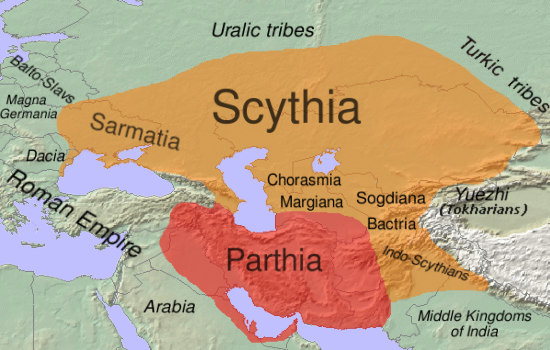Don Jaguar
SENIOR MEMBER

- Joined
- Mar 12, 2011
- Messages
- 3,769
- Reaction score
- 0
Another map of Achaemenid empire's greatest extent is found which is not including all india in it. I think the previous map is not right.


Follow along with the video below to see how to install our site as a web app on your home screen.
Note: This feature may not be available in some browsers.



Another map of Achaemenid empire's greatest extent is found which is not including all india in it. I think the previous map is not right.



Wrong Information, Persian never ruled/controlled India.


PERSIA did rule some part of india but for a small portion of time..... at that time india included area known as pakistan today and some part of afghanistan too..... then this area was invaded by alexander and he did not penetrated further.... historians still debate whether he was defeated by porus or not.... but most say he defeated porus... anyways this area of present day pakistan and afghanistan was once again won by chandragupta mauryaMaybe they invaded india for a short time period and then gupta empire continued.

I request indian members to post some information about south indian empires also.

at that time india included area known as pakistan today and some part of afghanistan too..... then this area was invaded by alexander and he did not penetrated further.... historians still debate whether he was defeated by porus or not.... but most say he defeated porus... anyways this area of present day pakistan and afghanistan was once again won by chandragupta maurya
That would go kinda off topic,

This is just an overall of all the empires Iran controlled.
The reason the word "stan" is so common from India, to Kazakhstan, to Greece, to Egypt is because of mass Iranian influence.

Known about this portion.
But i don't think he really defeated porus.
Please if you have the info share it. I heard they use to have very strong empires and they defeated very strong opponents.

even i think porus defeated alexander but this is debatable...... moreover i thought if i talk of hindu king porus defeating alexander dat might stir a different kind of debate altogeder.... but its heartening to see pakistanis starting to take pride in dere history.... kudos to new beginning

stan/sthan has proto Indo-Iranian origin, that's why you find it from Central Asia to East Asia.
 "place of sand, desert", Pakistan "land of the pure" and golestan (گلستان
"place of sand, desert", Pakistan "land of the pure" and golestan (گلستان "place of roses, rose garden", Hindi devasthan ("place of devas, temple"), etc. The suffix is of Indo-Iranian and ultimately Indo-European origin, with the Proto-Indo-European root being *stā- "stand", which is also the source of English stand, Latin stāre, and Greek histamai (ίσταμαι
"place of roses, rose garden", Hindi devasthan ("place of devas, temple"), etc. The suffix is of Indo-Iranian and ultimately Indo-European origin, with the Proto-Indo-European root being *stā- "stand", which is also the source of English stand, Latin stāre, and Greek histamai (ίσταμαι , all meaning "stand", as well as Pashto تون (tun, "habitat" or "homeland") and Russian стан (stan, meaning "settlement" or "semi-permanent camp"). In Bosnian/Croatian/Serbian, stan means "apartment" in its modern usage, while its original meaning is "habitat". Also in Germanic languages, the root can be found in Stand ("place, location"), and in Stadt (German), stad/sted (Dutch/Scandinavian), stêd (West Frisian) and stead (English), all meaning "city". The suffix -stan is analogous to the suffix -land, present in many country names such as Finland or Deutschland.
, all meaning "stand", as well as Pashto تون (tun, "habitat" or "homeland") and Russian стан (stan, meaning "settlement" or "semi-permanent camp"). In Bosnian/Croatian/Serbian, stan means "apartment" in its modern usage, while its original meaning is "habitat". Also in Germanic languages, the root can be found in Stand ("place, location"), and in Stadt (German), stad/sted (Dutch/Scandinavian), stêd (West Frisian) and stead (English), all meaning "city". The suffix -stan is analogous to the suffix -land, present in many country names such as Finland or Deutschland.
Wrong Information, Persian never ruled/controlled India.

As far as i know, Persia expanded its boundaries up to India. But the Persian Empire like Alexander the Great, didn’t arrive to the center of present India but to present day Pakistan and up to the borders of present India..But never in Indian history was there a kingdom that ruled the whole of India. These different kingdoms that were established in different parts in India created different aspects of Indian history for different regions of India.

As far as i know, Persia expanded its boundaries up to India. But the Persian Empire like Alexander the Great, didn’t arrive to the center of present India but to present day Pakistan and up to the borders of present India..But never in Indian history was there a kingdom that ruled the whole of India. These different kingdoms that were established in different parts in India created different aspects of Indian history for different regions of India.



